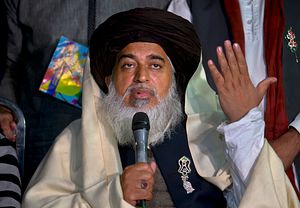The Pakistani state’s efforts to contain Tehreek-e-Labbaik Pakistan (TLP) are both promising and complicated. They are promising for the way that key members of the party, including its chief Khadim Hussain Rizvi, are charged with treason and terrorism, and placed behind bars. They are complicated in the sense that the narrative on which TLP was founded – violent opposition to any change in Pakistan’s controversial blasphemy laws – remains very much intact.
The religio-political party made headlines this November, when it violently protested the Supreme Court’s decision to acquit Aasiya Noreen, also known as Asia Bibi. Aasiya, a Christian woman, was accused of blasphemy in 2010 and sentenced to death by a Punjab municipal court. The top court’s decision to reverse this sentence, citing insufficient evidence, gave strength to protest sit-ins across major cities in the country. TLP’s top command, including Pir Afzal Qadri, also called for the assassination of Pakistan’s chief justice, and demanded that Aasiya’s name be placed on the Exit Control List. Damage to state and private property was extensive.
It is against this backdrop that the government’s decision to detain Rizvi (and more than 3,000 TLP workers) is a welcome change from its appeasement of hardline religious protesters. The intelligence-based crackdown began on November 23, with law enforcement personnel raiding TLP mosques and deploying preemptive units to the site of the 2017 Faizabad sit-in. This collective attempt serves as the first coordinated effort among the police, security agencies, and the government against the group since TLP’s rise to prominence in November last year.
What lends optimism to the government-led crackdown is TLP’s overt criticism of Pakistan’s powerful military. It was just recently that, for the first time, Khadim Rizvi called for the overthrow of Army Chief Qamar Bajwa, encouraging members of the institution to rise in rebellion. The Pakistan Army has a reputation for responding to criticism decisively, with its disintegration of the nonviolent Pashtun Tahaffuz Movement being the latest example. The TLP’s rift with these key institutions of the state raises skepticism about its continued growth and expansion in the country.
On an ideological level, however, the government’s efforts to contain the group remain largely ineffective. Last month, Prime Minister Imran Khan convened a two-day conference on the finality of Prophet Muhammad, assuring the religious clergy of his commitment to safeguarding Pakistan’s blasphemy laws. In addition, there has been little resolve on the government’s part to amend these laws, which TLP has repeatedly pointed to in an attempt to legitimize violence against minorities. Thus, the absence of legislative action extends a lifeline to the party’s ideology, and discourages concrete measures to cut TLP by its roots.
Interestingly, the Supreme Court’s verdict on Asia Bibi lays the foundation for curbing faith-based politics. “It is not for the individuals, or a gathering, to decide as to whether any act falling within the purview of Section 295-C has been committed or not,” states the 56-page verdict, categorically underlining judicial supremacy. The judgment also denies Aasiya’s conviction on the basis of mere allegations and “a fully qualified trial” – a landmark precedent for future cases.
Yet, the government’s decision to allow the TLP to file a review petition against Aasiya’s acquittal is a step in the opposite direction. Not only does it prevent the top court’s judgment from becoming binding, it allows hardline religious groups to steer the legal system in their favor. “If Asia case [sic] is not heard in the light of Sharia, we have every right to resume our peaceful protest,” tweeted a defiant Khadim Rizvi earlier last month.
It is important to consider the fact that the TLP has no memory of protest failures. Both times that it took to the streets, it forced compromises from the federal government – first with the resignation of the then-ruling Pakistan Muslim League-Nawaz’s law minister, and most recently, with Aasiya’s name on the Exit Control List.
Khan’s failure to disprove extremist blasphemy narratives, by underscoring the value of rule of law, has created a vacuum for the TLP’s narrative to flourish unabated. His genuine support across the nation could have been crucial leverage in impacting public perception.
As long as the government overlooks Tehreek-e-Labaik’s ideological motivations, it is difficult to construe nationwide arrests as a lasting solution. The current status of Pakistan’s blasphemy laws ensures that any religious outfit can allege blasphemy and stage violent sit-ins unpunished. In the event of such an occurrence, the state must decide between amending these laws to establish its writ, or continuing to surrender the rule of law to the demands of religious mobs.
Hannan Hussain is an Islamabad-based writer for Daily Times, DAWN and the Express Tribune. He is also the author of And the Candles Blew.

































